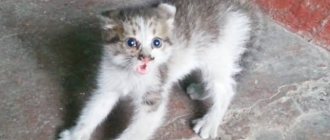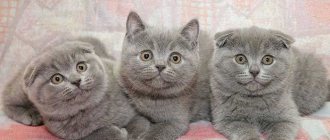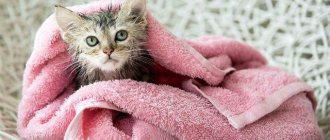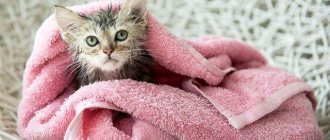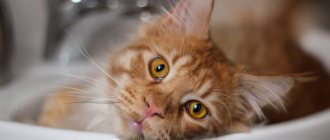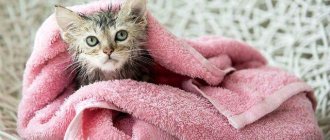Domestic cats are the most popular furry pets for modern families and single people. These affectionate creatures decorate life, create a cozy and comfortable home environment, teach children kindness and compassion, instill responsibility and brighten up the evenings. Having decided to get a mustachioed companion, the future owner wants to know how to choose the right kitten. There are many factors to consider in this matter.
Why do you need a cat in the house?
It would seem that all that remains is to decide on the breed of the tailed pet, but not everything is so simple. Of course, it is necessary to take into account the characteristics of a particular species, but there are also equally significant points. By purchasing and bringing a kitten into the home, the owner takes full responsibility for its well-being, health and, ultimately, fate. Cats are proud and freedom-loving animals; you will have to share not only your home space with them, but also give them enough attention and care.
If the potential owner is faced with the goal of finding a four-legged friend, then in this case you only need to know how to choose a healthy kitten. However, if the future owner is faced with a completely different task, for example, pursuing the commercial goal of breeding a specific breed, or he wants to choose a kitten for the home, or give his little one a birthday present, then the issue of choice should be approached more thoroughly.
Where is the best place to buy a kitten?
After you decide to choose a kitten and decide on the breed, you need to decide where to buy the animal. There are several options here :
- You can pick up a kitten on the street. On the one hand, this is a good thing: you will most likely save the life of such an animal, and the baby will have a home. On the other hand, if you adopt a kitten from the street, you must understand that there is absolutely no guarantee that it is healthy. With a 99% chance, you will need to at least remove fleas and worms. In addition, there is a possibility of encountering more serious diseases. Simply put, when picking up a kitten on the street, you must be prepared for its treatment and a longer period of adaptation to life in the house;
- You can buy a kitten second hand. You may think that with such a kitten there will be much fewer problems than with a street one. No matter how it is! Many sellers are dishonest and can deceive you. This is especially true for purebred kittens. It is quite possible that instead of a purebred animal, they will slip you an ordinary one. Of course, such a kitten is no worse than a purebred one, but paying money for one thing and actually getting something else is unpleasant;
- Pet stores also do not guarantee that the kitten you purchase will be purebred and healthy. It is best to take your baby to pet stores that value their reputation. You can read reviews about certain stores on the Internet or consult with friends;
- A good option would be to adopt a kitten from trusted acquaintances or friends. In this case, the chance of being deceived tends to be minimal. In addition, you can save a lot of money and at the same time help your friends: as a rule, finding owners for kittens (especially if they are not purebred) is quite difficult, so their owners will only be happy if they manage to find an owner for one or more babies;
- if you need a purebred kitten, a good option would be to choose a kitten at a show. There you can see many different purebred cats in person, chat with their owners and learn more about animal behavior. Breeders will help you choose the right pet and tell you about all the features of your chosen breed;
- The best option would be to choose a kitten in a special nursery. Typically, such establishments monitor the health of animals well, and cats with hereditary diseases are not used for breeding kittens.
© shutterstock
What gender is the little pet?
The first point, which is predetermining for many people, is the gender of the kitten. Females and males differ from each other from early childhood not only in external sexual characteristics. As a rule, the individual behavioral characteristics of pets largely depend on gender. They say that cats are more inclined to loyal friendship with their owner than naughty cats, which, in turn, are famous for their capricious and changeable disposition. Perhaps this is just a stereotype. How an animal will behave at home largely depends on the upbringing it received from the first months of life.
Before choosing a kitten from the litter, you can independently determine whether it is a boy or a girl. In one-month-old babies, external sexual characteristics are not clearly expressed, so the characteristic feature by which one can navigate is the distance between the anus and the urinary tract. In cats it is insignificant; in small cats it reaches 2 cm.
The most sociable cats
The Maine Coon's character is calm and patient.
Since the baby will constantly strive to communicate with the animal, especially at first, the cat must have the appropriate qualities
It is necessary that she is not burdened by attention to herself, and she takes it calmly
The most sociable cat breeds are:
- This type of pet has become popular not only due to its docile nature, but also its unusual appearance. This large animal resembles a lynx with fluffy ear tufts; it is also graceful and physically developed. In addition, cats of this breed are tolerant of children and will become excellent partners for them in games and pranks.
- Despite their somewhat “demonic” coloration, these animals are very good-natured and sociable, and curiosity is their calling card. In addition, Siamese cats are trainable and quickly master the simplest tricks, which will delight the child. However, you should remember that such pets are vindictive and vindictive, and make sure that the child does not offend his new friend.
- . This animal will be a real gift for the baby, since it will not leave a single step from its new owner. Pussies will constantly strive to communicate, ask to be stroked, and even sleep next to their little friend, which will not leave the child indifferent.
- Manx. These charming animals have the ability to easily adapt to a person’s mood and sense when they are needed. They are happy to play with children only on the condition that the kids do not offend them, and if the child is busy with his own business, the pussy will simply sit nearby, without attracting attention to itself. Another advantage of the Manx is that the pussies of this breed do not have a tail, which means there is no need to be afraid of accidentally stepping on it and causing aggression from the animal.
Of course, the final choice should be given to the child. Therefore, it is better not to try to surprise your son or daughter by purchasing a cat secretly, but to take the baby with you so that he can choose a new friend.
How to find your four-legged friend among others?
It often happens that in a litter of several kittens, one will purposefully approach a person. This is probably his kitten. If the baby instinctively showed interest in his future owner, his choice probably should not be neglected. He will become a devoted, loyal friend and an obedient pet.
An interesting detail that can tell you how to choose the right kitten is also the behavior of babies in a common flock. It all depends on the potential owner’s ideas about what a cat should be like at home. If you need a nimble, playful baby with leadership abilities, then you need to pay attention to this one. If you have a different picture in your imagination, for example, warm family gatherings in the evening with an affectionate cat in your arms, then you need to take a closer look at the calm, friendly baby.
British Shorthair
When thinking about what breed a cat should be - a friend and playmate for children, many felinologists (cat specialists) give a clear answer: British.
This breed includes long-haired and short-haired animals, but a pet with a plush coat and short hair is more suitable for children. According to legend, the famous Cheshire Cat was a British Shorthair.
Britons are companion cats. Play? Yes. Sleeping in an embrace with the owner? Yes too. This breed is not phlegmatic, but has a balanced, calm temperament. It is very difficult to anger a Briton; aggression is not characteristic of him.
The advantage of this breed is self-sufficiency. Animals are not annoying and do not require constant attention. They have excellent intelligence, and over the years they develop their own opinions on various matters.
This is an ideal option for keeping in an apartment: the British are clean, and for maintenance it is enough to comb their fur coat once a week.
Such cats have good health and strong immunity.
Another plus is that the British live for 15-20 years.
At what age is it better to buy a cat?
The ideal age for kittens to be weaned from their mother and moved to different homes is considered to be 2-3 months. There are enough advantages of this particular age:
- Firstly, kittens can feed themselves.
- Secondly, they have become quite independent, able to take care of their “cat” hygiene.
- Thirdly, kittens are mobile, active and willing to learn.
It is also important to know how to choose a healthy kitten. Of course, no one is immune from further problems with the pet’s health (viral diseases, infections and other ailments), but you can determine that the baby is currently completely healthy by the following signs:
- the kitten has a wonderful appetite;
- the entire set of baby snow-white teeth is present;
- the coat is shiny and silky;
- the kitten’s ears should not have any discharge (otherwise it is most likely a sign of ear mites);
- there are no wounds on his body;
- There are no fleas on the kitten's neck and chin.
A weakened kitten that is clearly not gaining weight, looks lethargic, and is most likely infected with worms. You should definitely not self-medicate; it is better to immediately go with your new family member for a preventive examination. Perhaps the veterinarian will be able to objectively assess the kitten’s condition and prescribe the necessary vaccinations.
The most hypoallergenic cats
Oriental cats have an unusual appearance.
Many parents rightly fear that their child will have an allergic reaction to cat hair, which will be everywhere, despite regular cleaning. For this reason, it is better to choose hypoallergenic cats, which include the following breeds:
- . Of course, the lack of hair on the body does not make this animal too attractive, but its owners do not have to worry about allergies. In addition, the body temperature of “hairless” cats is higher than human, and often babies sleep in the same bed with “live hot water bottles”. In addition, sphinxes are completely non-aggressive and devotedly love their owners.
- . The fur of such a cat also does not cause allergies, and you can not be afraid to bring it into the house where the child lives. In addition, these animals are beautiful, active and playful, and children will definitely like them.
- . These short-haired animals with large ears are also hypoallergenic and safe for sensitive children. By nature, they are quite flexible and loving, devoted to their owners and can become a true friend for the baby.
- Despite the presence of long, thick and fluffy hair, animals are also classified as hypoallergenic. These huge beauties can easily win the heart of a child and will love him deeply and devotedly. The only disadvantage of these animals is that the baby is unlikely to be able to carry such a friend in his arms, since some individuals reach a weight of up to 18 kg.
Best articles: Signs about cats
Other breeds of animals whose fur does not cause allergies are safe only in most cases, but it is impossible to talk about 100% hypoallergenicity of an individual whose body is covered with a thick “fur coat”.
How to decide on the breed?
The next determining factor, which plays a huge role in choosing a pet for your home, is its breed, especially if the cat is expected to participate in various exhibitions and competitions. By the way, having settled on a specific cat breed, you must:
- study the behavioral characteristics of its representatives;
- visit exhibitions;
- read reviews from more experienced breeders regarding its maintenance and care.
For example, the well-known Siamese cats are much more likely to develop genetic diseases than any other representatives of the feline family. Or, purposefully not wanting to have a long-haired cat, many choose the hairless Sphynx, without even realizing how much more difficult it is to care for it compared to other breeds.
Features of purebred cats
It is also necessary to take into account the fact that animal breeds bred by artificial selection through the genetic sophistication of scientists have by nature weaker immunity. Much less of these pets are endangered by an animal “without clan or tribe” that has undergone natural selection.
Many of the artificially bred breeds are not able to take care of themselves. A striking example is Persian cats, which cannot look attractive without a person. Their fluffy coat requires regular bathing, brushing and other activities, but cat licking is not enough. And in the psychological aspect, such animals are maximally dependent on the owner.
Meanwhile, there are many breeds that are characterized by the hunter's instinct. In addition to the desire to earn their living, they, as a rule, have naturally excellent physical characteristics. Among the natural born hunter cats are:
- Norwegian forest;
- Maine Coons;
- bobtails.
Limited apartment space is not suitable for these predators. Private houses and a garden with many trees are where they can always frolic to their heart's content.
It is always necessary to remember that when choosing a kitten, the owner takes on a whole range of obligations and a mountain of responsibility. Animals are not toys or an addition to the home interior. Cats of any breed trust and become attached to humans, the main thing is not to betray them.
The nature
The breed of a cat does not guarantee that the pet will have the desired character traits. However, cases of “undesirable” nature in purebred cats are an exception to the rule.
Sociable and talkative
Communicating with your cat is a pleasant activity that talkative pets will happily share with their owner. If you want to discuss the weather with your cat every day, the following breeds are suitable:
A purr that's fun to talk to
Kitchen Talk Lover
Warm and smooth myavlik
Fan of philosophical conversations
Accompanies every action with his “meow”
Thai cat
Loves to talk even to herself
Sociable cat breeds enjoy philosophical conversations with their owners. Do not choose this breed if you value silence in your home.
Meowing can also irritate a cat's owner. If you prefer not to hear unnecessary sounds, choose from these breeds:
A cat who is too lazy to meow
Able to communicate with the owner without making sounds
Northern wisdom and silence
Doesn't meow while being fed
Turkish Angora
The Snow Queen
Exotic cat
Doesn't waste energy talking
Silent cats won't bother you and you'll keep your home calm
Representatives of these breeds will only meow for important reasons.
Active and energetic
It’s interesting to watch active cats: today the pet wanted to explore the closet, and tomorrow he will become an astronaut! These are the cats that love activity:
Astronaut cat with fiery color
Curious entertainer
Energetic and smart
Jumper with a short tail
Comes up with problems and solves them
Turkish van
Lover of games and swimming
Owners of energetic cat breeds will have to constantly come up with something to keep their pet occupied. But it's worth it! They will be happy to solve your puzzles and wait for the next ones.
Lazy cats
There are cats that don't like to run around their owners' shelves. You can eat well and then sleep well! The following breeds are true sloths:
Loves to eat and sleep
A cat who is interested in lying with his owner
Real cat pillow
Always resting to be ready for the hunt
Moves only to find a comfortable position
Exotic cat
Sloth cat with a cute face
Lazy cat breeds are a good choice for phlegmatic people. Slothful cats can be so inconspicuous that only a regularly empty bowl hints at the existence of a cat in the house.
Affectionate and kind
People get cats to pet them and love them! Affectionate breeds themselves come to hug and kiss, so they are suitable for loving owners:
They follow their owner like a tail
A cat who will live on your shoulder
Ball with love for affection
Will be happy to come pet you
Always remain affectionate kittens
Ragdoll
Tame cat with a submissive character
Such breeds are reluctant to get off their owner: they don’t like to part with their beloved friend! Choose an affectionate cat breed if you are willing to give it enough attention.
Smart cat breeds
It is interesting to communicate with intelligent pets: they understand speech, easily learn commands and become a true friend. Smart cat breeds include:
Easy to learn commands and rules
Trainable and intelligent cat
High intelligence and innovative thinking
A lively mind and good learning ability
A cat that acts like a dog
Turkish Angora
Know the wisdom of human life
Such cats can be trained: they learn to fetch a ball, perform actions, dance and walk on a leash. Cats with high intelligence are the choice of people who do not want to get a dog.


